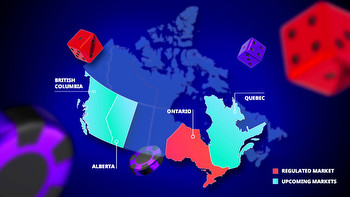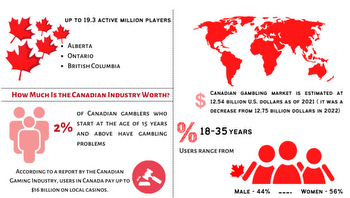Should Quebec follow Ontario and legalize online gambling?

According to experts, the global online gaming/sports betting industry was worth $231 billion in 2021
August 18, 2022
$231 billion – According to experts, that’s how much the global online gaming/sports betting industry was worth in 2021. But the party is beginning to end for many offshore operators. Wherever money is being made, the government eventually gets its cut. For example, in 2005, the UK moved to regulate sports betting and online gambling. France and Italy followed suit in 2010 with gambling laws of their own. And in 2012, New Jersey became the first US state to legalize online gaming and sports betting.
Until recently, Canada had remained a haven for many offshore operators, but gambling’s illegal status in this country changed in 2022 when Ontario became the first province to create a legal online gambling framework. By applying through the Alcohol and Gaming Commission of Ontario, online casinos and regulated sports betting operators can now set up shop.
Gambling’s illegal status in Canada changed in 2022 when Ontario became the first province to create a legal online gambling framework.
This development comes on the heels of the passage of Ontario’s Bill C 218, which legalized single-event sports betting nationwide. VIXIO GamblingCompliance, a British gaming consultancy, currently estimates the value of gaming activity at Ontario’s licensed operators to be 1.6 billion CAD annually – and that number is expected to double by 2026. For an overview of the casino landscape in the province, check out the Ontario Online Casino Sites.
So a third of Canadians can now bet legally online. But should other Canadian provinces like Quebec follow Ontario in legalizing online gambling? Is regulating online gambling a good thing for Quebec?
The Ontario gaming and sports betting industry has gotten off to a roaring start. However, Quebec is a vastly different market, and there are also downsides to regulations Quebec may want to avoid. So let’s explore some key arguments for and against opening the Quebec market to private gambling firms.
Arguments for legalization
First off, online gambling is a way to generate revenue for the province. With a population of nearly 8.5 million people, Quebec is the second most populous province in Canada. However, like many provinces in Canada, the last few years have left Quebec’s finances in a precarious state. With revenue recovering – but still beneath 2019 levels – the Quebec government is looking for new ways to raise money. And one way to do that is by legalizing online casinos and sports betting.
By creating a licensing system for online gambling companies, the Quebec government could earn revenue by taxing casino games, supplementing their income from Loto Quebec and their brick-and-mortar casinos. This initiative would provide a much-needed financial boost to a province dealing with battered finances and soaring inflation.
‘By creating a licensing system for online gambling companies, the Quebec government could earn revenue by taxing casino games.’
It could also be a way to better control problem gambling. While some people can game responsibly, gambling and sports betting can become a serious problem for others. Studies have shown that problem gambling fell in Canada from 2002 to 2018. But in recent times, significant anecdotal evidence has suggested a rise in troubling gaming behaviour.
If the Quebec government legalized online gambling and sports betting, it would establish measures to protect vulnerable people and help problem gamblers get the assistance they need. By requiring effective responsible gambling tools, such as deposit limits and self-exclusion, Quebec regulators could keep any increase in problem gaming to a minimum.
Arguments against legalization
While gaming legalization could lead to a drop in problem gambling, the opposite could happen. Online websites are more accessible than your typical brick-and-mortar casino. Nowadays, every screen is a potential online casino – with a few clicks, anyone in Canada can bet online from the comfort of their couch. And it’s all too easy to get carried away on these sites.
Online gambling firms and game providers exploit human psychology, encouraging problematic behaviours like chasing losses. That said, most problem gamblers find ways to get their fix. If they can place bets on flies crawling up a wall, they will. But if Quebec regulations move these players towards needed help, the province can avert an increase in problem gaming.
‘Online gambling firms and game providers exploit human psychology, encouraging problematic behaviours like chasing losses.’
Online gambling and sports betting could generate revenue for the Quebec government, but there are better ways to achieve this goal. For example, the province could focus on attracting new businesses and investments, rather than pulling funds from the pockets of its most vulnerable citizens. This would create jobs and increase tax revenue, minus the potential downsides of online gambling. Additionally, the government could increase taxes for those who can afford it. This would be a more effective way to raise provincial revenues without exposing vulnerable people to the risks of gambling addiction.
The bottom line
As with most issues, there is no easy answer. Gaming companies aren’t the mustache-twirling villains their opponents make them out to be. After all, if we tolerate the casino down the street, how can we oppose sportsbook websites? But if we’re honest with ourselves, gambling has more than its share of downsides. However, one thing is clear – Canada loves gambling and sports betting. Especially in Quebec, where two-thirds have placed a bet at least once in their lives. So denying Quebecers their right to bet isn’t the answer. But can vulnerable people be protected with a proper regulatory framework? With a modest tax on operating revenue, the social programs that Quebec residents adore could have a new funding source.
Rob Lloyd has been working closely with the online gaming industry in Canada and worldwide since 2018. Besides the gaming industry, Rob is an avid traveler who has been to more than 60 countries and frequently works with travel and tourism agencies.




































